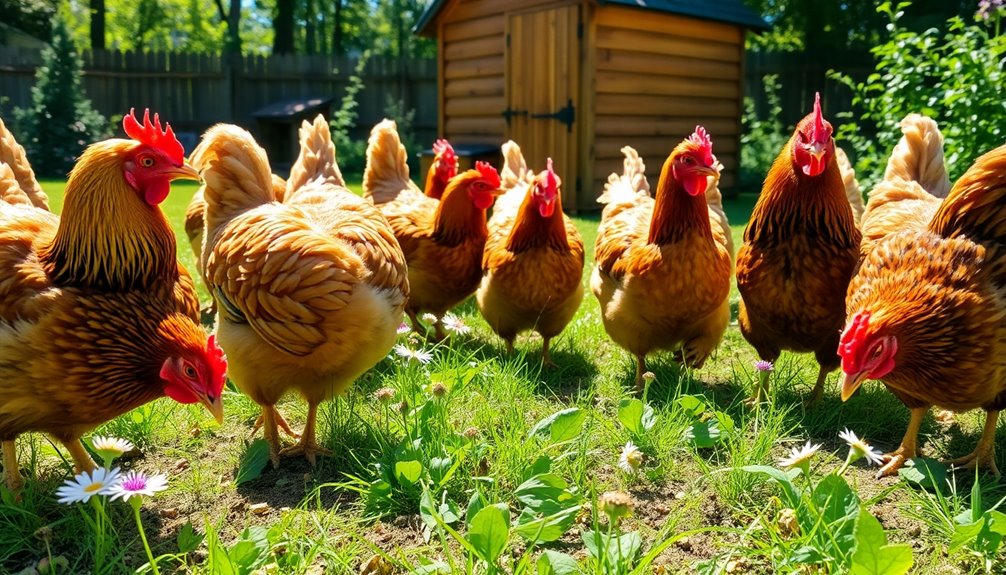Foraging chickens eat a variety of foods, from insects like beetles and worms to greens and seeds. This natural diet provides essential nutrients that enhance both their health and egg quality. By consuming insects, they get high-quality protein, while greens boost their vitamin intake. This diverse foraging helps produce eggs with richer yolk color and taste, along with increased omega-3 fatty acids. Healthier diets lead to stronger eggs with thicker shells. If you want to know how to maximize your chickens' foraging opportunities and guarantee first-rate egg production, there's more to discover!
Key Takeaways
- Foraging chickens primarily consume insects like beetles, grasshoppers, and worms, providing essential protein for egg production.
- They enjoy a variety of greens and leafy vegetables, enriching their diet with vitamins and minerals.
- Seeds, fruits, and additional natural food sources contribute to a diverse and nutritious diet.
- Foraging increases omega-3 fatty acids and antioxidants, enhancing egg nutritional value and flavor.
- A well-rounded foraging diet leads to healthier hens and improves the quality of eggs produced.
Importance of Foraging
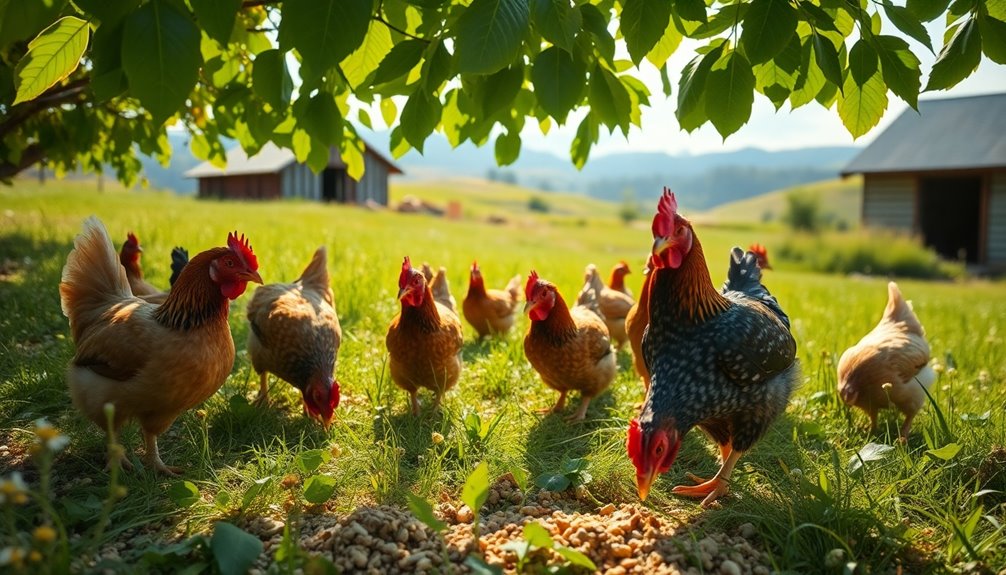
Why is foraging so important for chickens? Foraging allows your chickens to access a diverse range of nutrients that are vital for their health and well-being. By seeking out worms, beetles, and seeds, they not only enjoy a varied diet but also stimulate their natural behaviors. This activity contributes to improved egg quality, resulting in richer yolk color and better flavor.
Research shows that hens that forage outdoors can achieve a higher omega-3 fatty acid content in their eggs, greatly enhancing their nutritional value. When your chickens engage in foraging, they mimic their natural instincts, which leads to stress reduction. Lower stress levels are crucial for maintaining consistent egg production and overall flock health. Encouraging foraging in your flock means you're promoting healthier chickens that produce better-quality eggs. Additionally, a raw food diet can further enhance the nutritional profile of your chickens' diet.
The combination of diverse nutrients from their foraging activities not only supports their well-being but also benefits you as a consumer. Ultimately, a focus on foraging can lead to eggs that aren't just nutritious but also delicious, making it important for both your chickens and your kitchen. Additionally, proper nutrition is essential for overall animal health, influencing not just egg production but the well-being of your entire flock.
Key Components of Their Diet
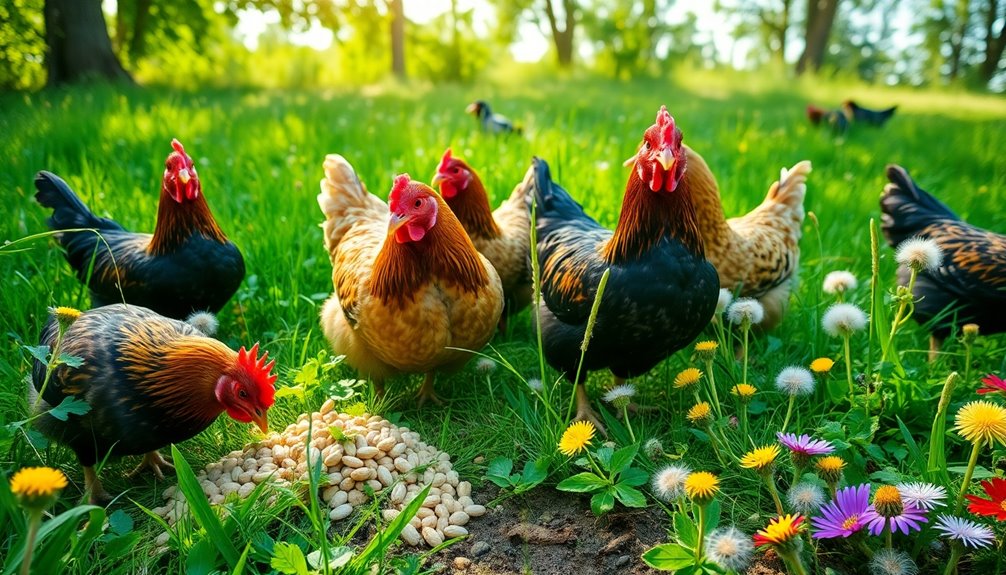
A well-rounded diet is essential for foraging chickens, as it directly impacts their health and egg production. When chickens forage, they consume a diverse array of foods that provide crucial protein and nutrients. Their diet primarily includes insects such as beetles, grasshoppers, and worms. These critters not only serve as an excellent protein source but also encourage natural behaviors, keeping your chickens active and engaged.
In addition to insects, chickens actively seek out greens and leafy vegetables. These plants enrich their diet with essential vitamins and minerals, important for ideal egg quality.
The combination of protein from insects and nutrients from greens creates a balanced diet that greatly enhances the nutritional profile of the eggs they produce. You'll notice improvements in omega-3 fatty acids and overall vitamin content, leading to healthier eggs.
Nutritional Benefits of Foraging

While foraging, chickens reap numerous nutritional benefits that greatly enhance their overall health and egg quality. By consuming a diverse range of insects, seeds, fruits, and greens, these birds obtain essential protein and vitamins that are imperative for their development.
Insects like beetles and grasshoppers serve as high-quality protein sources, essential for egg production and the overall health of your hens. Foraging allows chickens to increase their intake of omega-3 fatty acids and antioxidants from natural sources, considerably improving the nutritional profile of the eggs they produce.
In fact, foraging can help chickens fulfill up to 30% of their daily protein requirements, leading to healthier birds and better egg quality. The varied diet supports their immune system, making them less susceptible to diseases.
As a result, you'll notice that the eggs have richer yolk color and enhanced flavor profiles. By encouraging foraging, you're not just providing a natural diet; you're ensuring your flock thrives, yielding eggs that aren't only nutritious but also delightful to taste.
Embrace foraging to cultivate a vibrant, healthy environment for your chickens.
Impact on Egg Quality
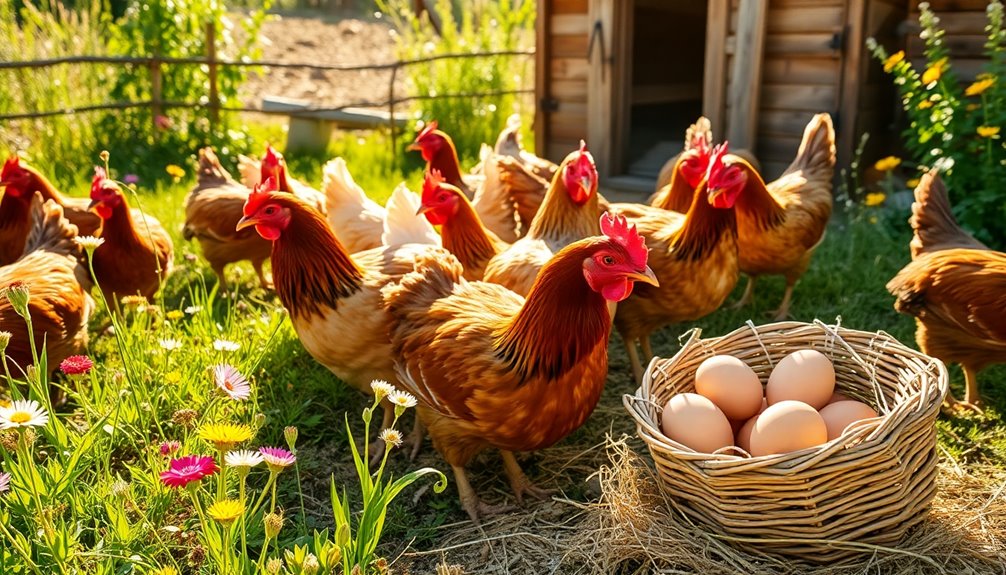
Foraging has a significant impact on egg quality, transforming the nutritional value and flavor of the eggs your hens produce.
When hens have access to a natural diet rich in foraged items, they produce eggs that not only taste better but also boast enhanced nutritional profiles.
Here are three key benefits of foraging on egg quality:
- Higher Omega-3 Fatty Acids: Hens that forage for insects and greens yield eggs with increased omega-3 fatty acids, promoting better yolk health and overall nutritional value.
- Improved Yolk Color and Flavor: A diet that includes beetles and worms leads to vibrant orange yolks, indicating higher beta-carotene content, which enhances both taste and visual appeal.
- Stronger Shells and Consistent Production: Foraging helps bolster hens' overall health, resulting in better shell strength and more consistent egg production rates.
Nutrient deficiencies from a lack of foraging can lead to thinner shells and decreased egg quality.
Enhancing Foraging Opportunities
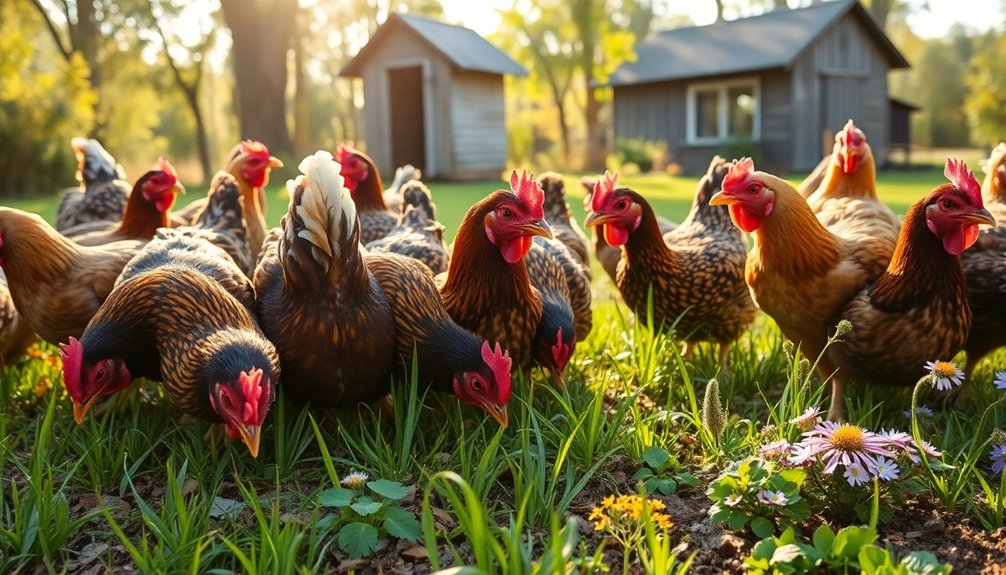
To maximize the benefits of foraging on egg quality, enhancing foraging opportunities is essential. Providing a diverse range of foraging options, like access to grassy areas, lets your chickens naturally seek out important nutrients such as insects, seeds, and leafy greens. This variety not only enriches their healthy diet but also stimulates their natural feeding behaviors, resulting in improved protein content.
Incorporating foraging treats, such as dried mealworms and black soldier fly larvae, can further enhance their nutritional intake. Research shows that hens allowed to forage produce eggs with improved nutrient profiles, including higher omega-3 fatty acid content.
To achieve a balanced diet, rotate grazing areas to guarantee your chickens have continual access to fresh foraging opportunities. This practice not only benefits their health but also aids in pest control and soil health on your farm.
It's vital to monitor the foraging environment regularly, making sure it remains safe and clean. By doing so, you'll prevent the ingestion of harmful substances while maximizing the benefits of foraging, ultimately leading to better egg quality and happier, healthier hens.
Frequently Asked Questions
What to Feed Chickens to Make Eggs More Nutritious?
To make your chickens' eggs more nutritious, feed them a balanced diet that includes high-quality layer feed with 16-18% protein.
Add omega-3-rich foods like flaxseed or fish oils for better yolk health.
Incorporate natural foraged items such as insects, greens, and seeds to boost protein and flavor.
Don't forget calcium sources like oyster shells for strong eggshells, and consider antioxidants from marigold petals to enhance yolk color and overall health.
What Improves Chicken Egg Quality?
Imagine your chickens laying eggs like golden treasures!
To improve egg quality, you'll want to focus on a balanced diet rich in protein, calcium, and essential vitamins. Incorporate amino acids and guarantee they get enough calcium for strong shells.
Don't forget vitamins A, D, and E for immune health and better yolks. Adding omega-3s and natural antioxidants from foraged foods can also elevate the flavor and nutritional value of those precious eggs!
What to Feed Chickens to Make Eggs Taste Good?
To make your chickens' eggs taste good, focus on a varied diet. Incorporate high-protein treats like mealworms and black soldier fly larvae to boost flavor.
Allow foraging opportunities for them to munch on insects, seeds, and greens, which enhances egg quality. Don't forget to add calcium sources, like crushed oyster shells, for stronger shells.
Using organic feed with supplements like marigold petals can also improve yolk color and taste considerably!
What Is the Best Feed for Chickens for Eggs?
When you're choosing the best feed for your chickens to optimize egg production, look for a layer feed with 16-18% protein.
It should include essential vitamins and minerals, especially calcium for strong eggshells.
Complete feeds like pellets guarantee your hens get balanced nutrition without selective eating.
Consider adding omega-3 fatty acids and antioxidants to enhance egg quality.
Always account for your flock's specific needs based on breed, age, and activity level.
Conclusion
In the grand tapestry of chicken care, foraging weaves a vibrant thread that enriches both their lives and yours. By embracing their natural instincts, you'll watch your flock flourish, transforming their diet into a cornucopia of nutrients. As the sun rises and sets, you'll witness the magic of foraging reflected in the quality of their eggs—golden treasures that nourish your family. So, let your chickens roam free; it's a simple way to elevate their health and your breakfast table!

